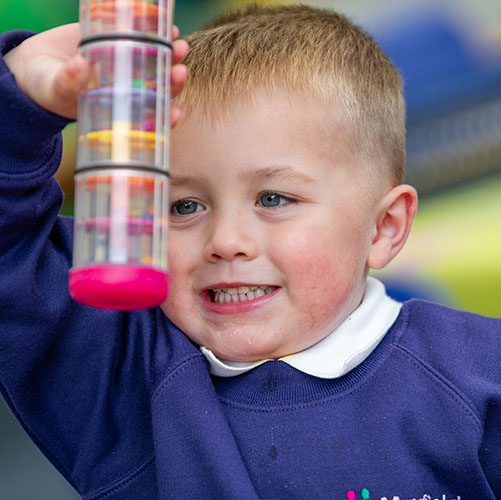Mathematics
Vision for Maths (Intent)
At Mayfield, the high-quality mathematics Curriculum provides children with a foundation for understanding the world; the ability to reason mathematically; an appreciation of the beauty and power of mathematics, and a sense of enjoyment and curiosity about the subject. Mathematics should be interwoven across all aspects of the curriculum.

Maths Subject Leader- Miss Timperley
Long Term Plan
|
|
Long Term Plan
|
Key Vocabulary
|
|
Maths Vocabulary
|
National Curriculum Aims
The National Curriculum for Maths aims to ensure that all pupils:
- become fluent in the fundamentals of mathematics, including through varied and frequent practice with increasingly complex problems over time, so that pupils develop conceptual understanding and the ability to recall and apply knowledge rapidly and accurately
- reason mathematically by following a line of enquiry, conjecturing relationships and generalisations, and developing an argument, justification or proof using mathematical language
- can solve problems by applying their mathematics to a variety of routine and non-routine problems with increasing sophistication, including breaking down problems into a series of simpler steps and persevering in seeking solutions.
How is Maths taught and what does it look like at Mayfield? (Implementation)
In mathematics we believe children need a great deal of practical experience and discussion to achieve a thorough understanding of mathematical concepts and skills to prepare them for life. We place great emphasis on mental calculation and oral work.
Children’s skills are developed to allow them to move fluently between representations of mathematical ideas and make rich connections, develop fluency, mathematical reasoning and competence in solving increasingly sophisticated problems as their knowledge and competence grows and they move through the school.
Fluency
At Mayfield we focus on fluency in maths, it is about developing number sense and being able to use the most appropriate method for the task at hand and to be able to apply a skill to multiple contexts. The National Curriculum states ‘that pupils should become fluent in the fundamentals of mathematics through varied and frequent practice’. Mathematical fluency is the ability to quickly and accurately recall mathematical facts and concepts.
At Mayfield we practise fluency through:
- Fluent in Five – 3 times a week
- Times Table Teaching – twice a week
Fluent in Five is 3 or 4 or 5 arithmetic questions. Children should be given 5 minutes to try and answer the 3/4 questions and then marked whole class.
It is designed to be done onto whiteboards or printed and completed in books. In the first half-term, there is no expectation for it to be evidenced in books straight away but as the term goes on evidence would appear in books.
Times tables are directly taught twice a week, once completed out loud/whole class using chanting and games etc and then once evidenced in books with a clear title outlining the number bonds, counting, times table/s being focused on.’
Mastering Number
To support pupils in Reception, Year 1 and Year 2 we follow the Mastering Number program to develop good number sense.
This project aims to secure firm foundations in the development of good number sense for all children from Reception through to Year 1 and Year 2. The aim over time is that children will leave KS1 with fluency in calculation and a confidence and flexibility with number. Attention will be given to key knowledge and understanding needed in Reception classes, and progression through KS1 to support success in the future.
This programme focuses on the key knowledge and understanding needed in Reception classes, and progression through KS1. Participating schools will receive central training (online and face-to-face) and a wealth of pupil-facing resources.
Maths No Problem
At Mayfield we base our Maths lessons on Singapore Maths principles and have adopted ‘Maths No Problem’, it is designed and organised to ensure that children fully master key maths concepts in a visual and practical manner.
A Maths lesson will follow five main stages during a Maths – No Problem!lesson. These components are exploration, structured discussion, practice, journalling and reading.
- Exploration
The teacher will present the whole class with a problem to explore. We call this the anchor task, it will be the central focus of the whole lesson and is known as the ‘Explore’.
- Structured discussion
Then following Zoltan Dienes’ theory, the structured discussion comes next and is a teacher-led whole class discussion, gathering together some of the answers and methods from the explore.
- Master
The teacher uses an example to set out the methods and explain learning. The aim for the teacher is set out clear methods to use and rectify misconceptions from the ‘Explore’ and ‘Structured Discussion’.
Practice
In the Maths — No Problem! programme there are two types of practice: guided and independent.
- Guided Practice is found in the textbook, where learners work through the questions in pairs or individually,
- Then Independent Practice can be found in the workbook which pupils will work through by themselves.
Both sets of questions have been designed with variation in mind, so learners can develop a deeper understanding of the topic as they work through the exercises. During both types of practice, the teacher will be observing.
Maths Lessons at Mayfield using Maths – No Problem! include:
- Inclusive Activities
Tasks and activities are designed to be accessible for all pupils while still containing challenging components for advanced learners.
- Problem Solving
Maths lessons and activities, based on Richard Skemp’s work, teach problem-solving approaches to encourage higher-level thinking.
- The CPA Approach
Pupils learn new concepts initially using concrete items such as counters, then progress to pictorial representations before finally using abstract symbols, such as the equals sign.
- Variation
Questions and examples are carefully varied by expert authors to encourage pupils to see there is more than one way to solve a problem and avoid mechanical repetition.
We also make regular use of summative assessment in the form of ‘Mayfield All Star Assessments’ which are designed to revisit prior learning and ‘Unit Checks’ which check pupil learning at the end of a block of work.
What will my child leave Mayfield knowing, understanding and appreciating in Maths? (Impact)
At Mayfield we recognise that mathematics is essential to everyday life and our aim is to make mathematics at Mayfield as relevant as possible to the children’s lives. Mayfield children are taught to reason mathematically and to develop a sense of enjoyment and curiosity about the subject.
Children enjoy celebrating their successes weekly in the newsletter and TT Rock Stars. We also take part in local and national mathematics events such as: NSPCC Number Day, Enterprise Week, HGS Maths Competition, Maths Week England and much, much more!

Maths Pupil Voice – What do our children think of Maths at Mayfield? (Impact)
I like adding, subtracting and TTRS. I think that maths is good for your brain!
I like learning about maths as it tests my thinking!
Maths is interesting, fun and creative. I love the way it all interlinks!
It’s fun and so important as a lot of jobs use maths!



Mayfield Primary School is proud to be part of the Cranmer Education Trust
Cranmer Education Trust is a company limited by guarantee and an exempt charity registered in England. Company registration number: 07687709. Registered Office: Cranmer Education Trust, c/o The Blue Coat School, Egerton Street, Oldham OL1 3SQ. The website address is www.cranmereducationtrust.com and the phone number 0161 785 5082.



